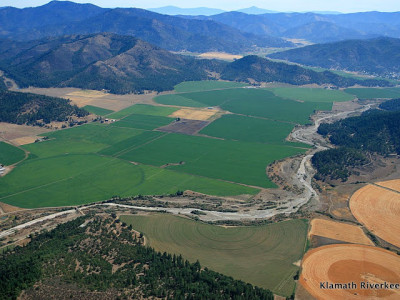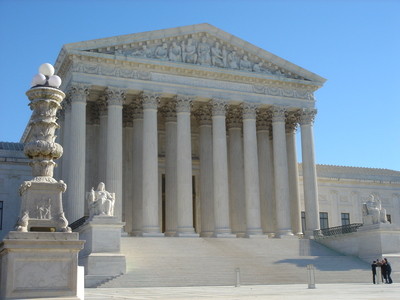Litigation
Groundwater and the public trust doctrine, California style
California trial court rules that public trust doctrine applies to pumping that reduces flow in a navigable waterway
If you follow California water law or environmental law, you probably have been aware that the Environmental Law Foundation has been pursuing a public trust claim based on groundwater pumping that affects the Scott River. Last week they gained a victory at the trial court level, with a ruling that endorses the principle that groundwater …
Continue reading “Groundwater and the public trust doctrine, California style”
CONTINUE READINGA win for EPA on mountaintop removal
D.C. Circuit upholds Enhanced Coordination Process, refuses to review agency guidance
The D.C. Circuit has rejected a challenge to consultation procedures developed by the EPA and Corps of Engineers for reviewing mountaintop removal mining permits and to EPA’s guidance for reviewing permits issued by the Corps or state permitting agencies. Because it rests on standard administrative law, the decision shouldn’t merit comment. But it does, because …
Continue reading “A win for EPA on mountaintop removal”
CONTINUE READINGUpdate: U.S. Supreme Court Denies Review in California Low Carbon Fuel Standard Case
Justices Decline to Address Constitutionality of LCFS
The U.S. Supreme Court today denied certiorari in closely-watched cases in which the constitutionality of California’s Low Carbon Fuel Standard (LCFS) was being challenged. The LCFS is, in turn, an integral part of the state’s multifaceted strategy to reduce California’s aggregate greenhouse gas emissions as required under AB 32, the state’s landmark 2006 climate change …
CONTINUE READINGCalifornia’s Low Carbon Fuel Standard: Before the Supreme Court
Will the Justices Choose to Decide the LCFS’s Constitutionality?
You might think that the U.S. Supreme Court, having decided the Utility Air Regulatory Group v. EPA Clean Air Act case on Monday, was done for the current Term when it comes to environmental law and policy. Think again. Today the justices met in conference to decide whether to grant review in a large number of pending …
Continue reading “California’s Low Carbon Fuel Standard: Before the Supreme Court”
CONTINUE READINGStanding, Settlement, and Mass Torts
BP is trying to use standing law to wiggle out of its own settlement agreement. The courts have been right to say no.
BP entered into a settlement in a massive class action against it arising out of the BP oil spill. Now it’s trying to get out of part of the settlement while keeping the rest of the deal in place. BP’s argument involves three areas of confusion in standing doctrine: how does it apply to class actions, …
Continue reading “Standing, Settlement, and Mass Torts”
CONTINUE READINGBreaking News: U.S. Supreme Court Renders Split Decision in Major Climate Change Case
The U.S. Supreme Court today issued its long-awaited decision in Utility Air Regulatory Group v. Environmental Protection Agency, the justices’ third encounter with climate change law and policy. In a Solomonic ruling, the Court ruled that EPA lacks authority to require the operators of “stationary sources” of greenhouse gas emissions (power plants, factories, etc.) to obtain …
CONTINUE READINGCalifornia Court Upholds State Water Board’s Broad Authority to Ban Unreasonable Uses of Water
Ruling is Especially Timely, Given California’s Ongoing and Severe Drought Conditions
I recently wrote about a then-pending court case in which California grape growers were challenging the State Water Resources Control Board’s limits on the growers’ diversion of water from California rivers and streams to provide frost protection for their grapes. That litigation is important because it goes to the heart of the Board’s authority under …
CONTINUE READINGBP Spill + 4
Four years ago, the BP Deepwater Horizon was still gushing oil. The well was finally capped in mid- July. There’s been a lot of legal action since then, but it’s hard to keep track of all the piecemeal developments. Here’s quick rundown. The Presidential Commission investigating the spill identified the “root causes” as management failures by industry and …
Continue reading “BP Spill + 4”
CONTINUE READINGUARG Decision — Due Any Day Now — Should Not Undermine the Legality of CAA Section 111d Rules
Case involves statutory interpretation questions not relevant to power plant rules
The U.S. Supreme Court should issue a decision in Utility Air Regulatory Group (UARG) v. EPA very soon, perhaps as early as Monday (the Court typically issues its opinions on Mondays and Thursdays at 10:00 a.m. EST). The case involves an important set of regulations designed to regulate greenhouse gases from large new “sources” (industrial facilities, chemical …
CONTINUE READINGSupreme Court: North Carolina Tort Plaintiffs Can’t Sue for Latent Injuries from Contaminated Sites
Court holds that federal law doesn’t preempt state statutes of repose
This morning, the U.S. Supreme Court issued its decision in CTS Corp. v. Waldburger. In this case, which my colleague Jesse Lueders described and analyzed in detail here and here, the Court had to decide whether state statutes of repose can bar tort lawsuits by people harmed by latent injuries from toxic contamination, by imposing …
CONTINUE READING







